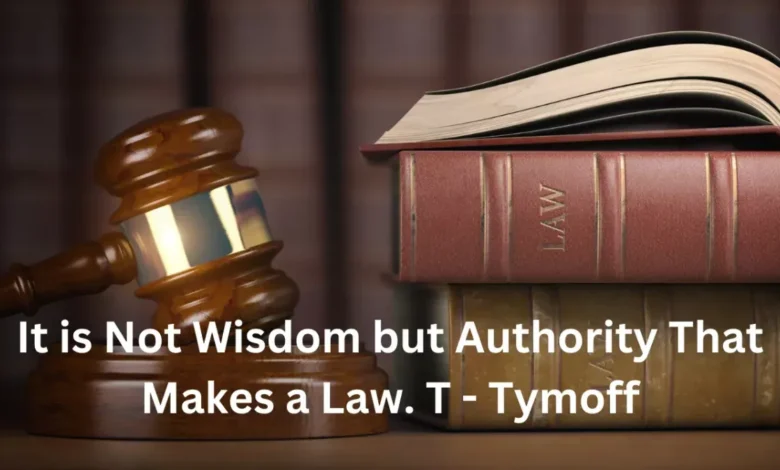it is not wisdom but authority that makes a law. t – tymoff

Introduction
In the intricate tapestry of legal systems, the interplay between wisdom and authority weaves the fabric of governance. Tymoff’s assertion, “It is not wisdom but authority that makes a law,” has ignited profound debates within legal circles, challenging the conventional wisdom that underpins legislative processes. As we delve into this discourse, it’s crucial to dissect the roles of wisdom and authority, understanding their symbiotic relationship and their distinct impacts on the legal landscape.
Exploring the Essence of Wisdom in Law
Wisdom in law transcends mere knowledge; it embodies the discernment to uphold justice, equity, and societal welfare. Throughout history, wise legal precedents have shaped the course of nations, from Hammurabi’s Code to modern constitutional interpretations. These landmark decisions reflect the collective wisdom of jurists, legislators, and scholars, grounding legal frameworks in ethical principles and pragmatic considerations.
In essence, wisdom in law serves as a guiding beacon, illuminating paths towards fair and equitable resolutions. It encompasses not only legal expertise but also moral clarity and foresight, anticipating the ramifications of legislative actions on present and future generations. From the eloquent judgments of revered judges to the nuanced deliberations of legislative bodies, wisdom infuses the veins of legal systems, fostering legitimacy and trust among citizens.
Deciphering Authority in Legal Systems
Authority, on the other hand, embodies the power to enforce and interpret laws, vested in institutions and individuals entrusted with governance. Legislative bodies enact statutes, executive branches execute laws, and judicial systems interpret and apply them. This tripartite division of authority forms the cornerstone of modern legal systems, ensuring checks and balances to prevent abuses of power.
However, the wielding of authority does not guarantee its legitimacy or effectiveness. While legal authority derives from constitutional mandates and democratic processes, its moral legitimacy hinges on public trust and adherence to principles of justice. Unbridled authority devoid of wisdom can lead to tyranny and oppression, undermining the very foundations of law and governance.
The Interplay Between Wisdom and Authority
The nexus between wisdom and authority lies at the heart of legislative processes, where the ideals of justice and the realities of power converge. While wisdom informs the crafting of laws, authority imbues them with the force of enforcement. In an ideal scenario, wisdom guides the exercise of authority, ensuring that laws reflect ethical imperatives and societal needs.
However, tensions often arise when the imperatives of authority supersede considerations of wisdom. Politically motivated legislation, arbitrary enforcement, and judicial overreach exemplify instances where authority eclipses wisdom, leading to injustices and societal discord. Conversely, when wisdom prevails over authority, legal systems become instruments of equity and progress, fostering social cohesion and stability.
Case Studies: Wisdom vs. Authority
The annals of legal history are replete with examples where wisdom clashed with authority, shaping the course of nations and the evolution of legal principles. Consider the landmark case of Brown v. Board of Education, where the Supreme Court’s wisdom in overturning segregation laws transcended prevailing authorities and catalyzed social change. Similarly, the Nuremberg Trials demonstrated the triumph of moral wisdom over authoritarian regimes, holding perpetrators of genocide accountable under international law.
Conversely, the internment of Japanese Americans during World War II epitomizes the erosion of wisdom in the face of unchecked authority, as fear and prejudice eclipsed constitutional rights. Likewise, the enactment of discriminatory laws targeting marginalized communities underscores the perilous consequences of authoritarianism divorced from ethical considerations. These case studies underscore the delicate balance between wisdom and authority, underscoring the imperative of ethical governance in legal systems.
Evolution of Legal Systems: Wisdom and Authority Over Time
The trajectory of legal systems reflects the evolving interplay between wisdom and authority, shaped by historical, cultural, and technological forces. From ancient codes etched in stone to digital statutes accessible at the click of a button, the mechanisms of law have evolved to meet the needs of changing societies. However, underlying this evolution is a perennial quest for equilibrium between the imperatives of authority and the dictates of wisdom.
In medieval Europe, the divine right of kings conferred unquestionable authority, relegating wisdom to the periphery of governance. The Enlightenment era ushered in a paradigm shift, championing reason, and individual rights as bulwarks against authoritarian excesses. Subsequent waves of democratization and globalization have further democratized legal systems, amplifying the voices of wisdom and accountability in governance.
Challenges to Tymoff’s Assertion
While Tymoff’s assertion underscores the centrality of authority in lawmaking, it elides the nuanced role of wisdom in shaping legal norms and principles. Critics argue that wisdom serves as the moral compass of legal systems, tempering the exercise of authority with ethical considerations and societal welfare. Moreover, authoritarian regimes have historically exploited legal authority to perpetrate injustices, underscoring the inherent risks of divorcing law from moral imperatives.
Counterarguments to Tymoff’s notion emphasize the symbiotic relationship between wisdom and authority, positing that effective governance requires a harmonious balance between the two. By integrating wisdom into legislative processes and institutional frameworks, legal systems can mitigate the risks of authoritarianism and foster a culture of accountability and justice. Thus, while authority may enact laws, it is wisdom that imbues them with legitimacy and moral authority.
Synthesizing Wisdom and Authority for Effective Governance
The quest for effective governance necessitates a synthesis of wisdom and authority, harmonizing the imperatives of legality with the dictates of morality. This entails fostering a culture of deliberative democracy, where reasoned discourse and ethical considerations inform legislative decisions. Additionally, robust checks and balances must be instituted to prevent the abuse of authority and uphold the primacy of constitutional principles.
Moreover, fostering legal literacy and civic engagement is essential to empower citizens as stewards of democracy, capable of holding authorities accountable to the collective wisdom of society. By embracing transparency, inclusivity, and participatory governance, legal systems can bridge the gap between authority and wisdom, fostering legitimacy and trust among diverse constituencies.
The Role of Public Perception in Shaping Legal Authority
Public perception plays a pivotal role in shaping the authority of legal systems, influencing the legitimacy and efficacy of laws and institutions. When citizens perceive authorities as just and accountable, legal mandates garner widespread compliance and respect. Conversely, perceived injustices or abuses of authority erode public trust, undermining the legitimacy of legal systems and fostering social unrest.
Addressing public skepticism towards legal authority requires proactive measures to enhance transparency, accountability, and responsiveness. By fostering open channels of communication and soliciting public feedback, authorities can demonstrate a commitment to democratic governance and the rule of law. Additionally, initiatives to educate and empower citizens about their rights and responsibilities can foster a culture of legal literacy and civic engagement, strengthening the social contract between rulers and the ruled.
Ethical Considerations: Balancing Authority and Justice
At the intersection of authority and justice lie profound ethical dilemmas, as legal actors grapple with competing imperatives and moral quandaries. The exercise of authority must be tempered by ethical considerations, ensuring that laws uphold principles of fairness, equity, and human dignity. However, navigating these ethical complexities requires vigilance and moral courage, as authorities confront the exigencies of governance and the demands of justice.
Unbridled authority devoid of ethical constraints can lead to systemic injustices and human rights abuses, undermining the legitimacy and moral authority of legal systems. Conversely, an overemphasis on moral purity may hamstring the efficacy of governance, impeding




